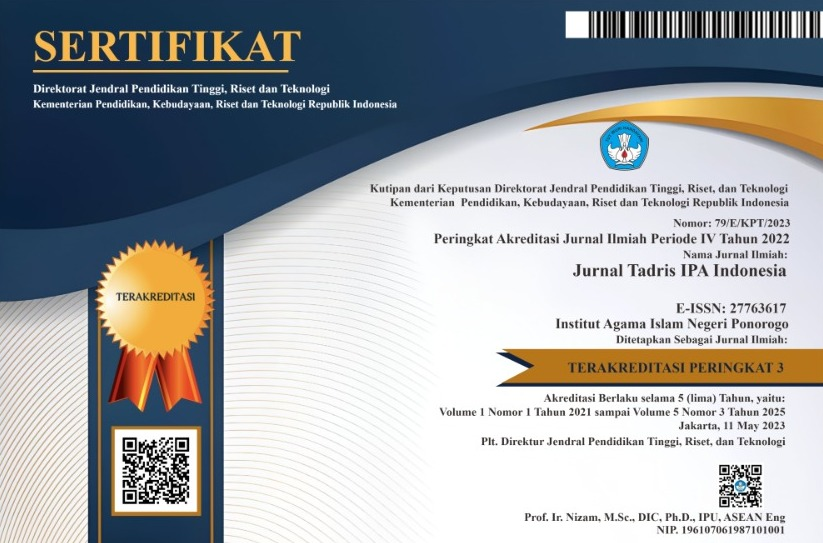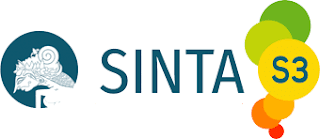Studi Praktik Gaya Hidup Berkelanjutan Lulusan Sarjana Ilmu Sains: Identifikasi Tantangan dan Hambatan
Abstract
Pemanasan global dan perubahan iklim sedang terjadi, hal itu merupakan masalah antropogenik, dan efeknya menimbulkan ancaman nyata bagi kondisi kehidupan manusia dan ekosistem. Gaya hidup berkelanjutan (sustainable behavior) menjadi salah satu solusi untuk mengurangi pemanasan global dan perubahan iklim karena perilaku berkelanjutan memenuhi kebutuhan generasi sekarang dan masa depan tanpa mengorbankan keutuhan sumber daya alam. Penelitian ini bertujuan untuk mengetahui praktik gaya hidup berkelanjutan lulusan sarjana ilmu sains serta mengidentifikasi tantangan dan hambatannya. Penelitian ini merupakan desain kuantitatif, dengan metode survei. Sebanyak 105 responden (78 perempuan, 27 laki-laki) yang berasal dari Jawa Timur berpendidikan S1 Rumpun Ilmu Sains dengan rentang usia 20-35 tahun mengikuti survei ini yang didistribusikan melalui platform online dan dianalisis deskriptif menggunakan Ms. Excel. Penelitian ini menggunakan instrumen yang diadaptasi dari Tapian-Fonlem untuk mengukur konstruk sikap pro-lingkungan, sikap hemat, dan sikap altruistik, yang dianggap sebagai prediktor perilaku berkelanjutan. Hasil penelitian ini menunjukkan 3 temuan penting, yaitu (1) adanya kontradiksi dalam perilaku pro-lingkungan responden; (2) sebagian besar responden setuju dengan beberapa praktik hemat, namun mereka juga menunjukkan kecenderungan untuk tidak mengubah gaya hidup yang konsumtif; dan (3) banyak responden yang sudah menunjukkan kepedulian terhadap sesama, namun masih ada ruang untuk mendorong partisipasi yang lebih aktif dalam kegiatan sosial.
References
Abbass, K., Qasim, M. Z., Song, H., Murshed, M., Mahmood, H., & Younis, I. (2022). A review of the global climate change impacts, adaptation, and sustainable mitigation measures. Environmental Science and Pollution Research, 29(28), 42539–42559. https://doi.org/10.1007/s11356-022-19718-6
Abdel-Shafy, H. I., & Mansour, M. S. M. (2018). Solid waste issue: Sources, composition, disposal, recycling, and valorization. Egyptian Journal of Petroleum, 27(4), 1275–1290. https://doi.org/10.1016/j.ejpe.2018.07.003
Abubakar, I. R., Al-Shihri, F. S., & Ahmed, S. M. (2016). Students’ assessment of campus sustainability at the University of Dammam, Saudi Arabia. Sustainability (Switzerland), 8(1). https://doi.org/10.3390/su8010059
Ardhiyansyah, A., Iskandar, Y., & Riniati, W. O. (2023). Perilaku Pro-Lingkungan dan Motivasi Sosial dalam Mengurangi Penggunaan Plastik Sekali Pakai. Jurnal Multidisiplin West Science, 2(07), 580–586. https://doi.org/10.58812/jmws.v2i07.538
Bank, T. W. B. G. and A. D. (2021). Climate Risk Country Profile: Indonesia. In World Bank Group. www.worldbank.org
Batista, M., Goyannes Gusmão Caiado, R., Gonçalves Quelhas, O. L., Brito Alves Lima, G., Leal Filho, W., & Rocha Yparraguirre, I. T. (2021). A framework for sustainable and integrated municipal solid waste management: Barriers and critical factors to developing countries. Journal of Cleaner Production, 312(December 2020). https://doi.org/10.1016/j.jclepro.2021.127516
Benevolenza, M. A., & DeRigne, L. A. (2019). The impact of climate change and natural disasters on vulnerable populations: A systematic review of literature. Journal of Human Behavior in the Social Environment, 29(2), 266–281. https://doi.org/10.1080/10911359.2018.1527739
Beniermann, A., Mecklenburg, L., & Upmeier Zu Belzen, A. (2021). Reasoning on controversial science issues in science education and science communication. Education Sciences, 11(9). https://doi.org/10.3390/educsci11090522
Bläse, R., Filser, M., Kraus, S., Puumalainen, K., & Moog, P. (2024). Non-sustainable buying behavior: How the fear of missing out drives purchase intentions in the fast fashion industry. Business Strategy and the Environment, 33(2), 626–641. https://doi.org/10.1002/bse.3509
Boone, H. N., & Boone, D. A. (2012). Analyzing Likert Data. Journal of Extension, 50(2). https://doi.org/10.1007/s11172-017-1908-3
Corral-Verdugo, V., Bonnes, M., Tapia-Fonllem, C., Fraijo-Sing, B., Frías-Armenta, M., & Carrus, G. (2009). Correlates of pro-sustainability orientation: The affinity towards diversity. Journal of Environmental Psychology, 29(1), 34–43. https://doi.org/10.1016/j.jenvp.2008.09.001
Corral-Verdugo, V., Carrus, G., Bonnes, M., Moser, G., & Sinha, J. B. P. (2008). Environmental beliefs and endorsement of sustainable development principles in water conservation: Toward a new human interdependence paradigm scale. Environment and Behavior, 40(5), 703–725. https://doi.org/10.1177/0013916507308786
Creswell, J. W. (2012). Educational Research (4th ed.). Pearson Education, Inc.
de Oña, J., Estévez, E., & de Oña, R. (2021). How does private vehicle users perceive the public transport service quality in large metropolitan areas? A European comparison. Transport Policy, 112, 173–188. https://doi.org/10.1016/j.tranpol.2021.08.005
Debnath, B., Bari, A. B. M. M., Ali, S. M., Ahmed, T., Ali, I., & Kabir, G. (2023). Modelling the barriers to sustainable waste management in the plastic-manufacturing industry: An emerging economy perspective. Sustainability Analytics and Modeling, 3(March), 100017. https://doi.org/10.1016/j.samod.2023.100017
Erlangga, D., Handayani, D., & Syafi’i, S. (2020). Konsep Walkability Index Dan Penanganan Fasilitas Pejalan Kaki Pada Kawasan Jalan Perkotaan Di Indonesia. Jurnal Riset Rekayasa Sipil, 4(1), 12. https://doi.org/10.20961/jrrs.v4i1.44633
Fawzy, S., Osman, A. I., Doran, J., & Rooney, D. W. (2020). Strategies for mitigation of climate change: a review. Environmental Chemistry Letters, 18(6), 2069–2094. https://doi.org/10.1007/s10311-020-01059-w
Fujii, S. (2006). Environmental concern, attitude toward frugality, and ease of behavior as determinants of pro-environmental behavior intentions. Journal of Environmental Psychology, 26(4), 262–268. https://doi.org/10.1016/j.jenvp.2006.09.003
Goyol, S. S., & Pathirage, C. (2017). Change Impacts on Transport Infrastructure in Agrarian Communities and Policy Implications for Agricultural Trade and …. https://www.fao.org/3/bu415e/bu415e.pdf
Gyanesh Kumar Tiwari. (2016). Sustainable Behaviors and Happiness: An Optimistic Link. International Journal of Indian Psychology, 4(1). https://doi.org/10.25215/0401.051
Hasiani, I. P., Kadiyono, A. L., & Susiati, E. (2020). Studi Komparatif Kematangan Karir pada Mahasiswa Rumpun Sains & Teknologi (Saintek) dan Sosial Humaniora (Soshum). PEMBELAJAR: Jurnal Ilmu Pendidikan, Keguruan, Dan Pembelajaran, 4(2), 50. https://doi.org/10.26858/pembelajar.v4i2.13460
Hidayah, N. Y., Herzanita, A., & Rimantho, D. (2021). Sampah Berkelanjutan Mahasiswa Fakultas Teknik. Tingkat Pengetahuan, Sikap, Dan Praktik Pengelolaan Sampah Berkelanjutan Mahasiswa Fakultas Teknik Universitas Pancasila, Jakarta, Indonesia, 13(2), 171–178.
Ibrohim, I., Kusumaningrum, I. K., Hamimi, E., Putra, W. E., Utomo, J., Kundariati, M., Hajar, M. U., & Malek, N. A. N. B. N. (2023). Science students’ literacy and faculty members’ perspective toward nanotechnology: Is it needed in 21st century education? Eurasia Journal of Mathematics, Science and Technology Education, 19(12). https://doi.org/10.29333/ejmste/13835
Ingaruca, M. (2022). Elevating Meaningful Youth Engagement for Climate Action. In UNDP (Issue March).
Jalil, A. (2019). Pengelolaan Keuangan Keluarga Solusi Keluarga Sakinah. Jurnal Hukum Islam Nusantara, 2(1), 67–84.
Janmaimool, P., & Chontanawat, J. (2021). Do university students base decisions to engage in sustainable energy behaviors on affective or cognitive attitudes? Sustainability (Switzerland), 13(19). https://doi.org/10.3390/su131910883
Klöckner, C. A., Sopha, B. M., Matthies, E., & Bjørnstad, E. (2013). Energy efficiency in Norwegian households - Identifying motivators and barriers with a focus group approach. International Journal of Environment and Sustainable Development, 12(4), 396–415. https://doi.org/10.1504/IJESD.2013.056348
Lally, M., & Valentine-French, S. (2019). Life-Span Development: A Psychological Perspective. Annual Review of Psychology, 1–468. http://dept.clcillinois.edu/psy/LifespanDevelopment.pdf
Milfont, T. L., Wilson, M. S., & Sibley, C. G. (2017). The public’s belief in climate change and its human cause are increasing over time. PLoS ONE, 12(3), 1–9. https://doi.org/10.1371/journal.pone.0174246
Myers, D. G. (2012). Psikologi Sosial Jilid 2. Salemba Humanika.
Pandowo, M. H. C., Tewal, B., Lengkong, V. P. K., & Wenas, R. S. (2021). Sustainable Behaviour In Higher Education: Antecedents And Consequences. Journal of Sustainability Science and Management, 16(7), 80–92. https://doi.org/10.46754/jssm.2021.10.007
Pheakdey, D. V., Quan, N. Van, Khanh, T. D., & Xuan, T. D. (2022). Challenges and Priorities of Municipal Solid Waste Management in Cambodia. International Journal of Environmental Research and Public Health, 19(14). https://doi.org/10.3390/ijerph19148458
Pinto, D. C., Herter, M. M., Patricia, R., Nique, W. M., & Borges, A. (2019). Recycling cooperation and buying status: Effects of pure and competitive altruism on sustainable behaviors. European Journal of Marketing.
Pudyastuti, P. S., & Nugraha, N. A. (2018). Climate change risks to infrastructures: A general perspective. AIP Conference Proceedings, 1977(March 2023). https://doi.org/10.1063/1.5043000
Ryu, H. C., & Brody, S. D. (2006). Examining the impacts of a graduate course on sustainable development using ecological footprint analysis. International Journal of Sustainability in Higher Education, 7(2), 158–175. https://doi.org/10.1108/14676370610655931
Sharpe, I., & Davison, C. M. (2022). A Scoping Review of Climate Change, Climate-Related Disasters, and Mental Disorders among Children in Lowand Middle-Income Countries. International Journal of Environmental Research and Public Health, 19(5). https://doi.org/10.3390/ijerph19052896
Sheehan, M. C., Fox, M. A., Kaye, C., & Resnick, B. (2017). Integrating health into local climate response: Lessons from the U.S. CDC climate-ready states and cities initiative. Environmental Health Perspectives, 125(9), 1–6. https://doi.org/10.1289/EHP1838
Singh, S., & Banerjee, S. (2024). Examining the effects of fear of missing out on sustainable food consumption: a social identity perspective. Asia Pacific Journal of Marketing and Logistics, ahead-of-p(ahead-of-print). https://doi.org/10.1108/APJML-10-2023-0969
Sonetti, G., Brown, M., & Naboni, E. (2019). About the triggering of UN sustainable development goals and regenerative sustainability in higher education. Sustainability (Switzerland), 11(1), 1–17. https://doi.org/10.3390/su11010254
Soza-Parra, J., & Cats, O. (2024). The role of personal motives in determining car ownership and use: a literature review. Transport Reviews, 44(3), 591–611. https://doi.org/10.1080/01441647.2023.2278445
Susanti, E., Nurzena, N., Herlina, H., Murny, M., & Avava, A. (2023). Pengaruh Literasi Ekonomi terhadap Sikap Hemat Siswa di Sekolah Menengah Atas Negeri 2 Siak Hulu. Instructional Development Journal, 6(2), 120. https://doi.org/10.24014/idj.v6i2.25469
Tapia-Fonllem, C., Corral-Verdugo, V., Fraijo-Sing, B., & Durón-Ramos, M. F. (2013). Assessing sustainable behavior and its correlates: A measure of pro-ecological, frugal, altruistic and equitable actions. Sustainability (Switzerland), 5(2), 711–723. https://doi.org/10.3390/su5020711
Tian, H., & Liu, X. (2022). Pro-Environmental Behavior Research: Theoretical Progress and Future Directions. International Journal of Environmental Research and Public Health, 19(11). https://doi.org/10.3390/ijerph19116721
Todd, S., & Lawson, R. (2003). Towards an understanding of frugal consumers. Australasian Marketing Journal, 11(3), 8–18. https://doi.org/10.1016/S1441-3582(03)70131-1
Twerefou, D. K., Chinowsky, P., Adjei-Mantey, K., & Strzepek, N. L. (2015). The economic impact of climate change on road infrastructure in Ghana. Sustainability (Switzerland), 7(9), 11949–11966. https://doi.org/10.3390/su70911949
Uren, H. V., Dzidic, P. L., Roberts, L. D., Leviston, Z., & Bishop, B. J. (2019). Green-Tinted Glasses: How Do Pro-Environmental Citizens Conceptualize Environmental Sustainability? Environmental Communication, 13(3), 395–411. https://doi.org/10.1080/17524032.2017.1397042
van Horen, F., van der Wal, A., & Grinstein, A. (2018). Green, greener, greenest: Can competition increase sustainable behavior? Journal of Environmental Psychology, 59, 16–25. https://doi.org/10.1016/j.jenvp.2018.08.007
Većkalov, B., van Stekelenburg, A., van Harreveld, F., & Rutjens, B. T. (2023). Who Is Skeptical About Scientific Innovation? Examining Worldview Predictors of Artificial Intelligence, Nanotechnology, and Human Gene Editing Attitudes. Science Communication, 45(3), 337–366. https://doi.org/10.1177/10755470231184203
Vitasse, Y., Ursenbacher, S., Klein, G., Bohnenstengel, T., Chittaro, Y., Delestrade, A., Monnerat, C., Rebetez, M., Rixen, C., Strebel, N., Schmidt, B. R., Wipf, S., Wohlgemuth, T., Yoccoz, N. G., & Lenoir, J. (2021). Phenological and elevational shifts of plants, animals and fungi under climate change in the European Alps. Biological Reviews, 96(5), 1816–1835. https://doi.org/10.1111/brv.12727
Wang, H., Ma, B., Bai, R., & Zhang, L. (2021). The unexpected effect of frugality on green purchase intention. Journal of Retailing and Consumer Services, 59(July), 102385. https://doi.org/10.1016/j.jretconser.2020.102385
Yang, C., Chen, H., Wang, Y., Wang, Y., Zhang, X., & Liu, Y. (2020). The effect of sense of community responsibility on residents’ altruistic behavior: Evidence from the dictator game. International Journal of Environmental Research and Public Health, 17(2). https://doi.org/10.3390/ijerph17020460
Yulianti, F., Zulfikar, R., & Lamsah. (2023). The Altruistic Connection: Unraveling How Altruism Drives Eco-Friendly Consumer Behavior in Green Marketing (Literature Review). International Journal of Professional Business Review, 8(10), e03656. https://doi.org/10.26668/businessreview/2023.v8i10.365
Copyright (c) 2024 Hikmah Buroidah, Muhamad Khoirul Anwar, M. Ubaidilah Hasan

This work is licensed under a Creative Commons Attribution-NonCommercial-ShareAlike 4.0 International License.
Jurnal Tadris IPA Indonesia allow the author(s) to hold the copyright without restrictions and allow the author(s) to retain publishing rights without restrictions, also the owner of the commercial rights to the article is the author.








